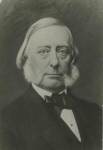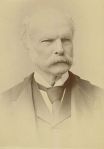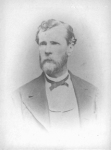The legislature of Kansas Territory and Andrew Reeder did not get along. He hauled them all out to his town of Pawnee and they promptly decided to leave. Most of the business they transacted there involved purging their membership of fairly elected antislavery members, though they did also vote to import the laws of Missouri to Kansas. Reeder viewed the legislature’s convening at Shawnee Mission, near the Missouri border, as illegal. He vetoed the bill to relocate and by his reading of the Kansas-Nebraska Act, the legislature could only meet where the governor called it to meet. They overrode his veto and did so anyway. From then on, Reeder vetoed everything that they passed. He sent along messages that made it clear he did so purely because they relocated and operated without his sanction.
Reeder sent his defense against charges of improper land speculation (parts 1, 2, 3, 4, 5, 6) to Washington just before he convened the legislature, at the end of June, 1855. He received his suspension at the end of July. The answer to his defense made it clear that more went into Franklin Pierce’s decision to fire Reeder than the details of any land deals, especially one that had yet to even take place. Pierce very obviously, given his criticism of Reeder for defending popular sovereignty back when the governor visited Washington, had in mind how Reeder made himself the enemy of the territory’s proslavery party (parts 1, 2, 3). Reeder had not received the memo that popular sovereignty meant expanding slavery under a formula that gave Northern Democrats some cover. It emphatically did not require that he should stand up for the integrity of elections.
On July 26, 1855, the Legislative Assembly’s celebrated the resignation of S.D. Houston, the lone antislavery survivor of the purge at the start of the month, by sending a petition to Pierce. The memorial came too late to influence Pierce’s decision, received in Kansas just days later, but unlike B.F. Stringfellow’s attack on the Governor or the editorials of the Squatter Sovereign, one can fairly construe it without qualification as the expressed will of the proslavery party’s leadership. I don’t know that the entire body voted on sending the memorial, but ten members of thirteen on the Council, including its president, and twenty-four members of twenty-five of the House, including Speaker John H. Stringfellow, put their signatures on the document.
The undersigned, your memorialists, members of the council and house of representatives of the territory of Kansas, respectfully represent that a crisis has at length arrived in the affairs of this territory, which make it imperative that you should interpose, so that our government (the wheels of which have been dragging so heavily theretofore, and which have at last come to a stand) may be relieved of the clog which has been attached to it, and be enabled to move once more in its regular course.
You simply can’t have a functioning government when one branch is at war with the other. Even with the ability to routinely override vetoes, little gets accomplished. When both parties can claim popular legitimacy, however tenuously, resolving the conflict becomes nigh impossible. The Republicans found this out with Andrew Johnson. If it sounds like a familiar situation in more recent contexts as well, it should. Over the past two decades it has become the norm in times of divided government in the United States.



You must be logged in to post a comment.